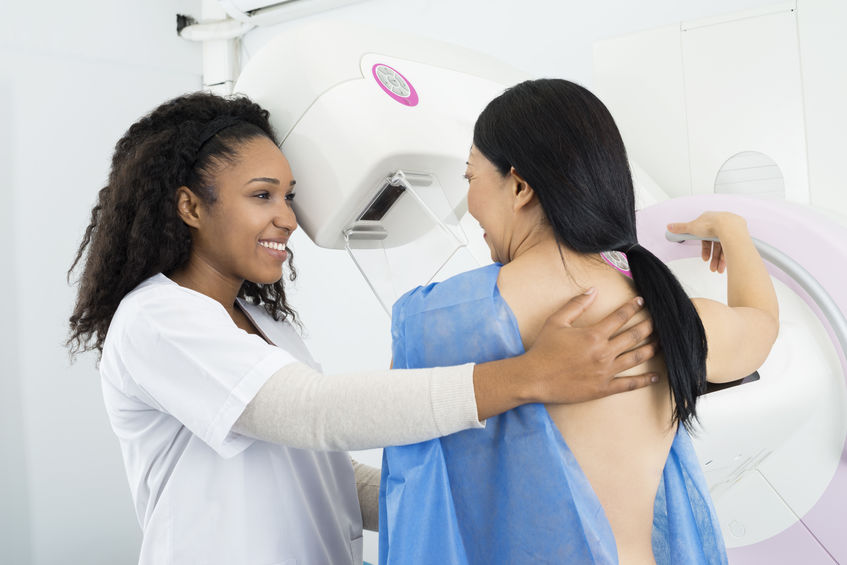Mammograms are considered an essential screening exam for women’s health. They are one of the most accurate and efficient tools for detecting breast cancer in its early stages, allowing treatment to begin early and be most effective. For most women, they simply provide peace of mind that they are healthy.
In previous years, the U.S. Preventive Services Task Force said women could start routine mammograms at 50, but new guidelines say women should begin getting regular mammograms every two years starting at age 40 if they are at average risk of breast cancer. A woman who has a high risk for breast cancer, as determined by a health care provider, may need to begin screening earlier and with additional screening tests.
Like any medical test or procedure, your first mammogram experience can be a little scary, and the anticipation before your appointment can be stressful. If you’re feeling anxious about your upcoming mammogram, here are a few tips to help you know what to expect, prepare for your screening, and calm your nerves.
Try to schedule your appointment for the week after your period.
When you get a mammogram, a machine compresses your breasts to spread and flatten the tissue so that the final image produces a clear view. Scheduling your mammogram for the week right after your period can help make this process less uncomfortable, as this is the point in your cycle at which your breasts will be the least swollen and tender.
If an appointment for that week doesn’t work out, at least try to avoid the week right before your period, when your breasts will be the most sensitive. If you’ve already started menopause, this will not be much of a concern for you.
If possible, choose a facility that specializes in mammograms.
While you can certainly get a high-quality mammogram at a general imaging facility, you will likely find the experience more comfortable and efficient at a facility specializing in mammograms or women’s health. The atmosphere tends to be more pleasant and reassuring, and the mammogram process is quicker and easier for women in this setting.
Whatever facility you choose for your first mammogram, you should stay with for all future screenings. This will help keep your images and records consistent and be more easily compared and evaluated from year to year.
There are a few things you shouldn’t wear to a mammogram.
Your facility will provide a list of what is best to wear and what to avoid for your appointment, but knowing it beforehand can help you feel more prepared. The main thing to avoid wearing will be deodorants, antiperspirants, lotions, or any fragrance on your upper body. These substances can appear as white spots on your X-ray and obscure the image.
While not strictly necessary, you should avoid wearing jewelry, accessories, or a one-piece outfit (dress, romper, etc.) to your screening. This will help to streamline the process when you arrive.
Share any important medical information with your technologist.
To ensure you receive the best-quality mammogram, you should inform your technologist of any relevant medical conditions before your screening. This may include a family history of breast cancer, past or current issues with your breasts, recent changes you’ve noticed in your breasts if you are breastfeeding, or if you are or could be pregnant.
Remember—your technologist is there to help. Don’t be afraid to ask questions, voice concerns, or inform them of anything that may affect your test, even if you’re unsure.
It’s okay to be nervous—but you have nothing to worry about.
Your first mammogram can be intimidating, but remember it is an important and routine procedure for your health and wellness. The entire process only takes about 20-30 minutes. It is normal to experience discomfort or mild pain during the screening, so if you do, don’t feel concerned that it means something is wrong.
Another thing to keep in mind after you’ve completed your mammogram is that most abnormal findings are not cancer. It is not uncommon to be called in for follow-up imaging. This is usually just a precautionary measure taken if your original X-ray comes back a little unclear or your image shows a common abnormality, such as a benign cyst or dense tissue.
Every women’s health service at South Avenue Women’s Services is completed with care, compassion, and confidentiality. When you schedule a mammogram with our specialists, our professionals will do everything possible to make you feel safe, comfortable, and reassured before, during, and after we have gotten your results.
Contact us at (585)271-3850 to schedule an appointment or learn more about our services!


